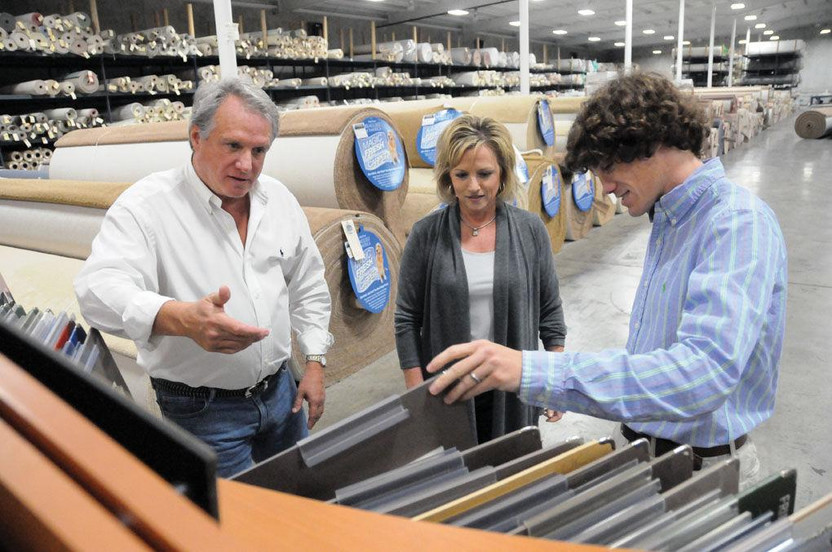Are you really getting wholesale pricing?
Posted by Johnny Holbert on 31st Jan 2023
Its a loose term, wholesale. Businesses alike use the term to describe their pricing tiers to the public. But how do you know if you're truly getting "wholesale" pricing? And what is wholesale pricing? Well, let's look at the definition of the word wholesale. Wholesale as a verb verb means to sell (goods) in large quantities at low prices to be retailed by others. In other words, wholesalers typically buy direct from a manufacturer or distributor in large quantities then resale that material to a retailer or dealer for a price better then what the retailer or dealer can normally pay for the same product. Flooring is no different and Georgia Carpet is a prime example of wholesaler. Georgia Carpet buys huge lots of carpet wholesale from manufacturers such as Shaw and Mohawk, then resells that to dealers all across the country. That's why we carry the slogan "Buy Where The Dealer Buys". Here's where this pays off for the consumer. Georgia Carpet Industries sells to some consumers for the same price that the dealers pay, depending where you are located of course. This is a prime example of the word "wholesale". And to prove that Georgia Carpet Industries sells wholesale the the public, we've included the following article, printed by the Dalton Daily Citizen on 2010. In this article Georgia Carpet is accused by the State of Georgia of selling to the consumer at wholesale prices. Enjoy
Carpet sellers say state is targeting them
Published November 19, 2010
For decades, Dalton and Whitfield County-based carpet sellers along U.S. Highway 41 and I-75 have plied their woven wares to the “man on the street” — or more aptly, the traveling buyer driving through town — at the same wholesale prices they’ve offered to other businesses.
But by deploying a little-used state law that was drawn up decades ago, the Governor’s Office of Consumer Protection (until recently the Office of Consumer Affairs, or GOCA) has begun levying fines with the threat of jail sentences against several sellers who use the word “wholesale” in their advertising — whether on billboards, in their literature or the vastness of the Internet.
In an era of draconian cuts in the state budget, some are alleging the office that is designed to help consumers is using the fines to build up revenues for state coffers. But others, like Craig Vaughn of Georgia Carpet Industries, contend that “big box” retailers are concerned Northwest Georgia carpet dealers are hurting the retailers’ business and they’ve pressured the state to use an obscure piece of legislation to target local carpet sellers.
Local attorney Greg Kinnamon, who is representing some of the carpet businesses, said violation of the ordinance is a misdemeanor that could draw a fine of up to $1,000 and possibly include a year of jail time. A handful of carpet sellers have changed their advertising and paid thousands of dollars in fines each just to get the state agency off their backs.
Others are fighting back, saying they’ve used “wholesale” in their advertising for years with no complaints from consumers.
“I don’t know how it got started, but I have an idea,” said Vaughn, who started his business at Connector 3 more than 30 years ago with one truck. “Do they realize how much tax revenue that pays them comes out of Dalton, Georgia, and Whitfield County? Do they know how many jobs they’re affecting? Do they realize the loss of revenue they’re going to incur for the state? This is just insane.”
Sharmin Arefin, a staff attorney with the Office of Consumer Protection, said in a conversation taped by Vaughn that included Vaughn’s son Ryan and local attorney Rick Brown last month that the issue is “the use of the word wholesale when it is being advertised to the general public. You can use wholesale when you’re selling to other businesses, just not to the general public.”
Arefin said in regard to enforcement of the statute, “Dalton is a huge place on our radar.”
“I don’t understand how all of a sudden you find this 50-year-old law and start enforcing it,” Vaughn said. “Can you explain that?”
“No, I can’t,” Arefin replied. “But it’s come to our attention and we are enforcing it.”
She said at one point, “I believe that we were called by the governor on this matter.”
Kinnamon said it was his “understanding” that Arefin had been removed from the cases and had been replaced by another attorney, Dana Norman, who did not return a phone call.



